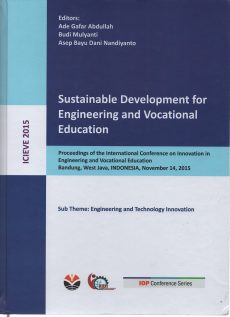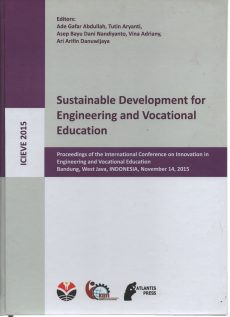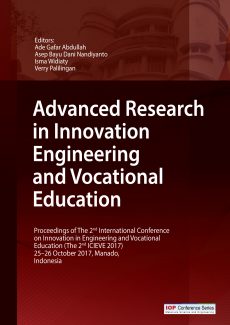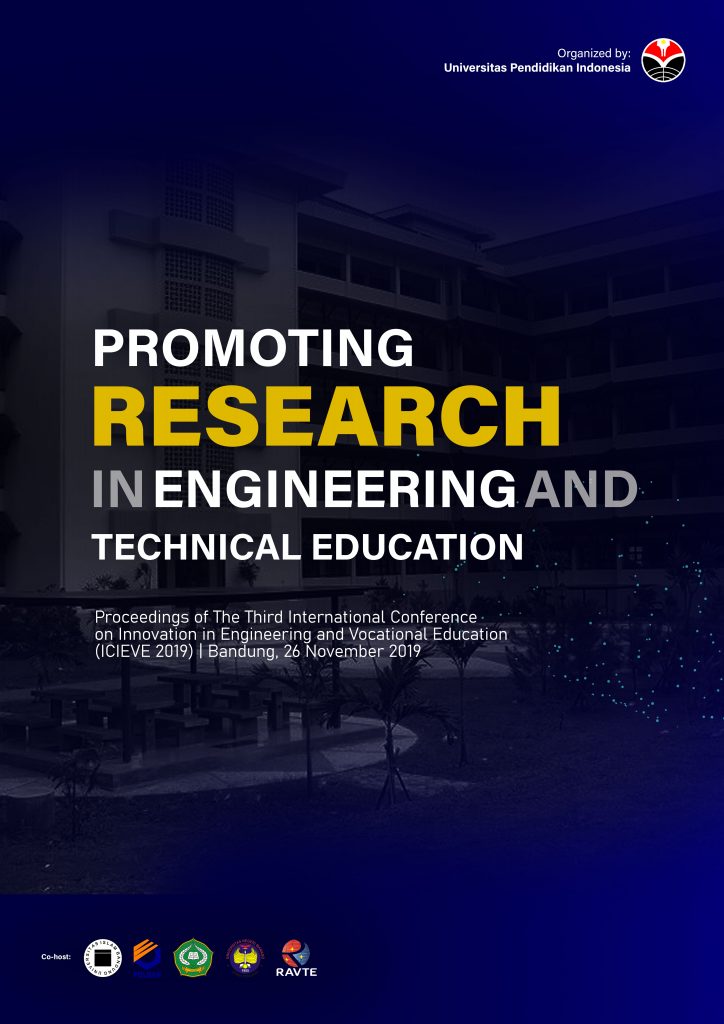Background
Welcome to the Fourth International Conference on Innovation in Engineering and Vocational Education (ICIEVE 2021). This biannual conference is hosted by the Faculty of Technology and Vocational Education, Universitas Pendidikan Indonesia, and will be held on 13 November 2021 via virtual platform. The conference has been a venue for the presentation of research results and new advances in engineering and vocational education. It seeks abstract submissions within the topics of engineering, technology innovations in vocational education, and other issues related to technical and vocational education. Taking the conference theme of “Emerging Innovations in Engineering and Vocational Education in a Post-pandemic Era”, we welcome researchers, practitioners, lecturers, and students to share ideas, studies, and research findings and participate in the conference.
Aim and Scope
Engineering and Technology Innovation
- Mechanical Engineering
- Chemical Engineering
- Civil Engineering
- Electrical Engineering
- Material Engineering
- Environmental Engineering
- Computer and Communication Engineering
- Architecture
- Petroleum and Geology
- Industrial Engineering
- Mining Engineering
Engineering Education
- Basic Science in Engineering Education
- Engineering Education Research
- New Technologies in Education
- Research and Development in Engineering Education
- Computers, Internet, Multimedia in Engineering Education
- Organization of Laboratories
- Technical and Vocational Education
Keynote Speakers
- Appointed professor of technical education and didactics at Otto von Guericke University Magdeburg
- Appointment as UNESCO UNEVOC Senior Research Associate
- Appointed professor of vocational education with a focus on commercial and technical matters at the University of Kassel
- Graduation of the habilitation procedure at the Otto-von-Guericke University Magdeburg (Dr. habil., Teaching qualification for vocational education with a focus on technical didactics) and appointment as a private lecturer (PD)
- Research work in the context of habilitation
- Ph.D. phil. at the Technical University of Dresden / Institute for vocational education with the title magna cum laude
- PhD student at the Faculty of Education / Institute for Vocational Education at the Technical University of Dresden
- Wikan Sakarinto is an Indonesian professor and academician. He is the Director General of Vocational Education in the Indonesian Ministry of Education and Culture since 8 May 2020. He was previously the dean of the Vocational School of the Gadjah Mada University from 2016 until 2020.
- After graduating from high school, Wikana took the State University Admission Examination to enter the Gadjah Mada University, but he did not pass the test. Wikan attended the university’s vocational school instead, and graduated from the vocational school in 1997 after three years of study.
- Wikan then continued his study at the mechanical engineering program in the Gadjah Mada University and graduated from the university with a Bachelor of Engineering in 2001
- Wikan obtained master’s degree after finishing mechanical engineering program in the University of Twente in 2003 and the Technical University of Dortmund in 2005. He later attended the Mechanical Engineering PhD program in the Kobe University until 2009.
- University Professor of Didactics of Health and Nursing Sciences, Otto von Guericke University Magdeburg, Faculty of Human Sciences, Institute 1: Education, Career and Media
- Call for the W2 professorship “Fachdidaktik Gesundheits- und Pflegewissenschaften”, Otto von Guericke University Magdeburg
- Call to the W2 professorship “Educational Science with a focus on theories and concepts of teacher education, educational research and educational diagnostics and learning guidance”, Katholische Hochschule Köln
- Junior Professor of Specialized Didactics Health and Nursing Sciences, Otto-von-Guericke-Universität Magdeburg, Fakultät für Humanwissenschaften, Institut für Berufs- und Betriebspädagogik
- Research assistant at the Institute for Social Pedagogy and Adult Education of the Goethe-University Frankfurt / Main (from Oct. 2013 to Sept. 2014 on leave of absence for the representation of the Junior Professorship for Didactics of Health and Nursing Sciences at the Otto von Guericke University)
- Research Associate at the Institute of Educational Science of the Gutenberg University Mainz, working group Adult Education
- Ilhamdaniah currently work as Assistant Professor in Department of Architecture Education, Faculty of Technical and Vocational Education, Universitas Pendidikan Indonesia. She attained her undergraduate degree from Institut Teknologi Bandung (2000); master degree from Faculty of ITC, University of Twente, The Netherlands (2005) funded by Netherlands Fellowship Programme (NFP); and doctoral degree from The State University of New York at Buffalo, United States (2019), funded by Fulbright-DIKTI scholarship Program.
- Her research interest covers the fields of architecture (building construction), urban planning, as well as technical and vocational education/training(TVET). Her current collaborative regional research on vocational education involves UPI and UTHM Malaysia, entitled: Developing a Blended Teaching and Learning Preparation Guideline for TVET Teachers in Digital Era: A Lesson Learnt from Two TVET Universities in Indonesia and Malaysia.
- Previously, she had actively involved in the Regional Cooperation Platform for TVET Teacher in Asia Pacific (RCP), served as research team leader for multi-year research grants from GIZ Germany under RCP collaboration network, namely Occupational Competence Need Analysis, and Post-Study Pre-service Vocational Teacher Education. Currently, she is involved as member in Regional Association of Vocational and Technical Education in Asia (RAVTE).
- Her publications on TVET has been published in several issues of Journal TVET@Asia and several proceedings of UPI International Conference on Technical and Vocational Education and Training. She had also served as the chairperson of the 6th UPI International Conference on Technical and Vocational Education and Training in 2020 jointly organized with The 5th International Conference on Innovative Education and Technology (ICIET2020) by Rajamangala University of Technology Thanyaburi (RMUTT), Thailand.
Call for Abstracts
Authors are requested to submit an abstract to the Organizing Committee by 30 September 2021 25 October 2021. The abstract must contain the following section: introduction, aim of the study, method, results, conclusion, and keywords. The abstract must have no longer than 200 words.
[IMPORTANT] To submit an abstract, authors must register first (click here). Then they can submit their abstracts by logging in to this site (menu “Submission System” then “Login”). The submitted abstracts will be selected for presentation. The manuscripts (full papers) should be submitted only after the abstracts are accepted. The full paper must be submitted two weeks after the conference day (26 November 2021). Please go to “Submission System” menu then “Login” to submit the full paper. Selected papers will be published in proceedings (Indexed by Web of Science). The papers should be written in English and must be between 4 to 6 pages.
A Brief Overview of ICIEVE 2021 Review Process
A group of reviewers with good reputation of international publication are going to be assigned to perform a rigorous reviewing process for the manuscripts of ICIEVE 2021 using Konfrenzi Automated Conference System. Prior to the review process, all the reviewers are to be briefed by Prof. Ade Gafar Abdullah on a virtual meeting regarding important points to review including the content, the systematic writing structure, and the language readability of the papers. Each reviewer is going to receive 4 – 5 through the submission system. They are then given two weeks to finish their review process and given a certain amount of incentive once they finish their task. After the deadline, the reviewed manuscripts are sent to the participants (authors) using the system through their personal account. The authors are to be given two weeks to revise their manuscripts and send them back to the committee using their account. Papers whose revision is in accordance with the reviewers’ comments will go into final editing process (paper template layout checking, proofreading, etc.) and those which need further revision will go into the second round of review process. All the manuscripts and other required data are submitted to the publisher after they pass final editing.





